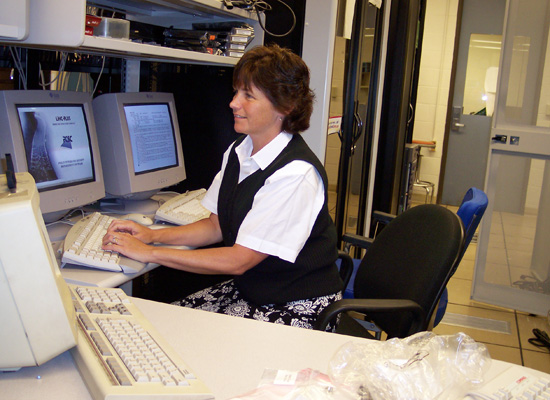Application Technology Specialist Creates Databases to Automate Tasks
 |
| Mary Schreck Glynn, application technology specialist, created the telephone directory database, media database and the student summer registration system. |
| Posted 09/09/05 |
| Q: What does it mean to be an applications technology specialist?
A: Basically, an applications technology specialist evaluates new technologies and creates and supports academic and administrative applications using new and proven technologies. All the applications are database related. Q: What is the purpose of these applications? A: The general purpose is to service the Wesleyan community by automating tasks and sharing information. Q: Can you give me a few examples of some of the tasks and information that have undergone this process? A: Some recent examples include he telephone directory database, media database and the student summer registration system. Q: How long do such projects generally take, and do you work on one at a time? A: The length of a project can vary depending on the complexity of the project and its dependencies. Basically, I work on several projects at the same time. Q: What is the process you follow to get from someones idea to actually completing a project? A: The most important part of completing a project is the needs analysis phase. It is important to have a complete understanding of the users goals and to work out the business logic before programming. The needs analysis phase requires lots of meetings, detailed information from the users, prototype screens and workflow. Q: The telephone directorys database sounds like a large undertaking. How did this come together? A: Along with Human Resources and Academic Affairs, we are working continually to try to improve the telephone directory process. There are three parts involved: first is the self-service module which allows faculty and staff access to change their personal data; second, is the module to help Human Resources and Academic Affairs update titles and employee information; third, is the process of printing and coordinating with the Information Technology Services printing service and the communications department. Q: I also learned that incoming freshman can register for two classes in the summer, before they get to campus. Can you elaborate a bit on this pre-registration system and why its important? A: The summer registration system is available to incoming students and is completed by mid-summer. Students fill in a series of screens with their preferences and the data is made available to the Academic Affairs office. In turn, the Academic Affairs office assigns courses and an advisor based on the students input. It is an important process since it helps Academic Affairs and student advisors become familiar with the students interests and it helps the students self assess and review the curriculum before they arrive on campus. Q: What is the media database, and what are some of its features? A: The media database allows faculty and staff to catalog all types of media including images, audio and video. The cataloged media is then grouped and stored in collections. The majority of media collections are course related and they are made available to students via the web. Q: What other projects are you currently working on? A: Currently, I am working with other departments on printing out the directory, library departmental collections, WesPress collections, Westel registration and internal applications. Q: Are there special programs you use to create these? What programming languages do you use? Some of the applications require vendor supplied solutions. However, the majority are home grown. Since Oracle is the universitys database standard, I am using the Oracle Application Server along with PL/SQL and javascript. Currently, we are looking into a couple of Oracle products, including HTMLDB and JDeveloper. Q: How did you become interested in this? A: I attended Fairfield University and earned a bachelors degree in English. When I graduated, I accepted a job at Yale University working with computer documentation. I learned a little about computers and moved into computer training. After a few years of computer training, I wrote a couple of programs and moved into the programming area and have since continued working in that area. Q: Tell me about your hobbies and interests outside of work? A: I enjoy lots of things outside of work, mostly, spending time with family and friends. My husband, Mike and I spend lots of time at hockey rinks and soccer fields watching our two children, Corey and Beth. My son Corey is a senior this year and Beth is in eighth grade. Q: What would you say is the most unique thing about you? A: I cheer for both the New York Yankees and Boston Red Sox. Q: Rumor has it that youre the nicest person Id ever meet. A: Whoever told you, I owe them big money. |
| By Olivia Drake, The Wesleyan Connection editor |

